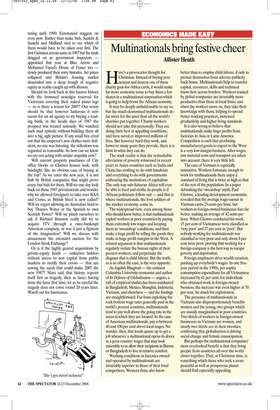Multinationals bring festive cheer
Allister Heath
Here’s a provocative thought for Christmas. Instead of buying your nearest and dearest one of those charity goat-for-Africa cards, it would make far more economic sense to buy them a few shares in a multinational corporation which is going to help boost the African economy.
It may be deeply unfashionable to say so, but the much-demonised multinationals do far more for the poor than all the world’s charities put together. Charity workers should not take this personally. They are doing their best in appalling conditions, and have saved or improved millions of lives. But however hard they work, and however many goats they provide, there is a limit to what they can do.
The stark reality is that the remarkable alleviation of poverty witnessed in recent years in Asian countries such as India and China has nothing to do with handouts and everything to do with governments embracing the institutions of capitalism. The only way sub-Saharan Africa will ever be able to feed and clothe its people is if African politicians follow suit — and that is where multinationals, the foot soldiers of the market economy, come in.
The widespread view, even among those who should know better, is that multinationals exploit workers in poor countries by paying them extremely low wages and keeping them in ‘sweatshop’ conditions; and then make a huge profit by selling the goods they make at huge profit margins in the West. A related argument is that multinationals regularly violate the human rights of their poorest workers, and perpetuate the disgrace that is child labour. But the truth, as is so often the case, is the very opposite.
As Jagdish Bhagwati — the eminent Columbia University economist and author of In Defence of Globalisation — argues, a raft of empirical studies has been conducted in Bangladesh, Mexico, Shanghai, Indonesia, Vietnam, and elsewhere — and the findings are straightforward. Far from exploiting the rock-bottom wage rates generally paid in the world’s poorest countries, multinationals tend to pay well above the going rate in the areas in which they are located. In the case of American multinationals, pay is between 40 and 100 per cent above local wages. No wonder, then, that locals queue up to get a job whenever a multinational opens its doors in a poor country: wages that may look miserable to us allow their recipients in Burma or Bangladesh to live in relative comfort.
Working conditions in factories owned and operated by multinationals are invariably superior to those of their local competitors. Western firms also know better than to employ child labour, if only to protect themselves from adverse publicity back home. Multinationals help to transfer capital, resources, skills and technical know-how across borders. Workers trained by global companies are invariably more productive than those in local firms; and when the workers move on, they take their knowledge with them, helping to spread better working practices, increased productivity and higher living standards.
It is also wrong to believe that multinationals make huge profits from factories in Asia or Latin America. Competition is such that producing manufactured goods to export to the West is a very low-margin business. After wages, raw material costs and transport are taken into account, there is very little left.
The case of Vietnam is especially instructive. Workers fortunate enough to work for multinationals there enjoy a standard of living that is twice as high as that of the rest of the population. In a paper debunking the ‘sweatshop’ myth, Paul Glewwe, a leading development economist, revealed that the average wage-earner in Vietnam earns 23 cents per hour, but workers in foreign-owned businesses fare far better, making an average of 42 cents per hour. When Glewwe conducted his work, 15 per cent of Vietnamese were classified as ‘very poor’ and 37 per cent as ‘poor’. But nobody working for multinationals was classified as very poor and only about 8 per cent were poor, proving that working for a foreign company is the best way to escape poverty and deprivation.
Foreign employers drive wealth creation, pushing up everybody’s wages. In one fiveyear period in the 1990s, per-capita consumption expenditure for all Vietnamese increased by 41 per cent; for individuals who obtained work in foreign-owned business, the increase was even higher at 70 per cent. So much for exploitation.
The presence of multinationals in Vietnam also disproportionately benefits women and the young, two groups which are usually marginalised in poor countries. Two thirds of workers in foreign-owned businesses in Vietnam are women, and nearly two thirds are in their twenties, confirming that globalisation is driving social change and female emancipation.
But perhaps the multinational companies’ most overlooked benefit is that they bring people from countries all over the world closer together. That, at Christmas time, is something which those who seek a more peaceful as well as prosperous planet should find especially appealing.






































































































































 Previous page
Previous page